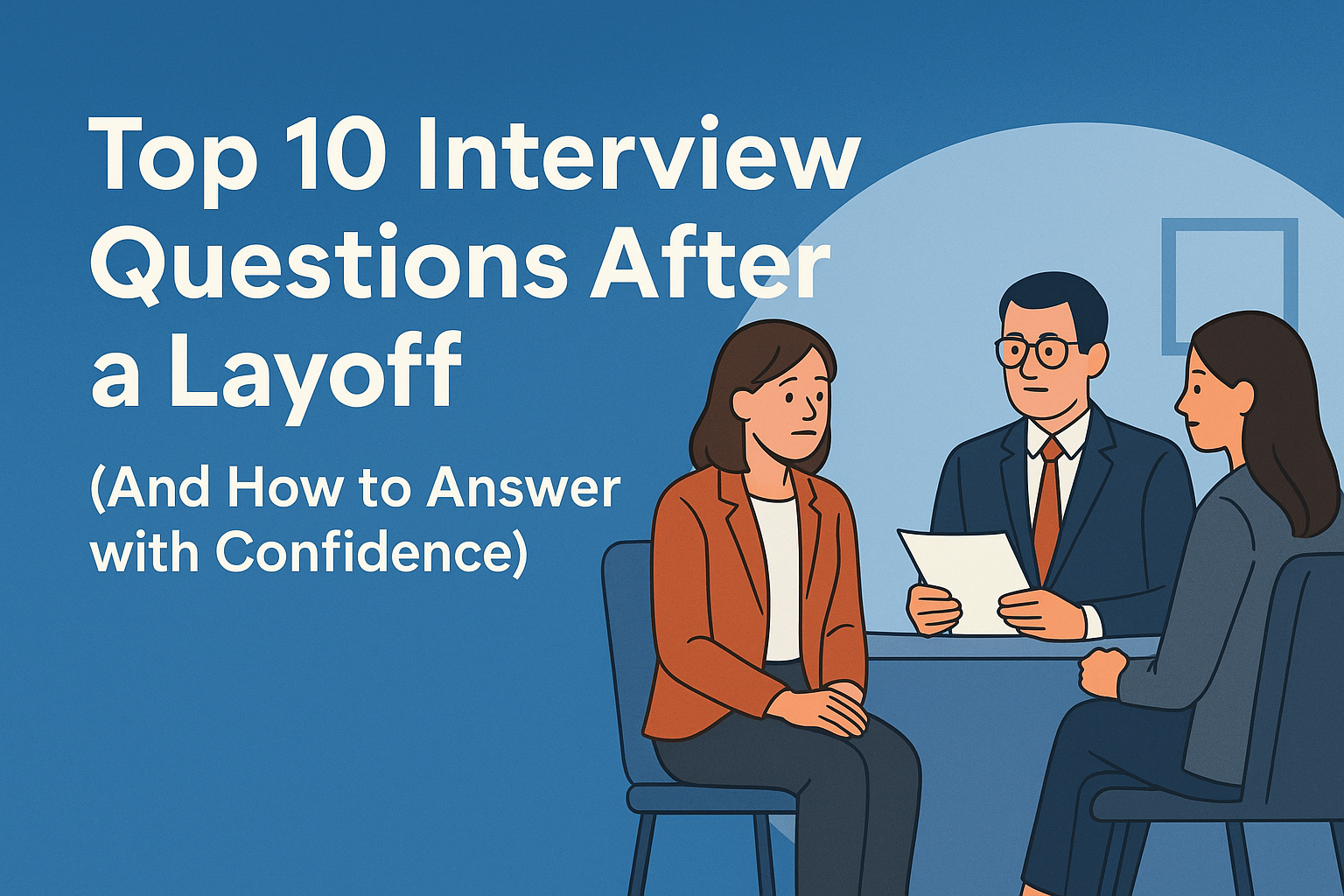Navigating job interviews after a layoff can feel overwhelming. Employers want reassurance that you’re resilient, skilled, and ready to move forward—not stuck in the past. The good news? With the right preparation, you can turn post-layoff interviews into powerful opportunities to showcase your strength, professionalism, and adaptability.
This guide breaks down the top 10 interview questions candidates face after a layoff and provides confident, polished responses that position you as a standout hire.
“Why were you laid off?”
This is often the first question interviewers ask because they want to understand whether the layoff had anything to do with your performance. Keep your answer brief, factual, and positive. Focus on company circumstances rather than personal shortcomings. For example, a clear explanation like “My company went through a restructuring that eliminated my department” keeps the tone professional. Ending with a forward-looking statement like “It helped me refocus on my strengths, and I’m excited to bring them to a new environment” shows confidence and growth.
“What have you been doing since the layoff?”
Hiring managers want to know you’ve maintained momentum. Discuss anything productive you’ve done—whether it’s upskilling through courses, taking on consulting or volunteer work, or developing personal or portfolio projects. This shows initiative and helps position you as someone who stays proactive during transitions.
“What did you learn from the experience?”
This question reveals your self-awareness and emotional maturity. Rather than dwelling on frustration or disappointment, highlight positive takeaways—perhaps resilience, clarity about your career direction, or strengthened professional skills. Interviewers appreciate candidates who can view challenging experiences with a growth mindset.
“Can you walk me through what happened at your last company?”
Interviewers may ask for more context about the layoff. Keep your answer professional and neutral. A statement such as “After a shift in strategic priorities, my role was among many eliminated” gives the essential information without hinting at negativity. Emphasizing how grateful you are for what you learned helps reinforce your professionalism.
“How did you handle the transition?”
Here, employers are evaluating how you respond to change and stress. Strong answers emphasize that you approached the situation thoughtfully—for instance, by updating your skills, reconnecting with your network, and focusing on opportunities that align with your long-term goals. This demonstrates maturity and decisive action rather than stagnation.
“What makes you a strong candidate despite the layoff?”
This is an opportunity to shift the focus fully to your strengths. Highlight accomplishments, quantifiable results, and any skills you’ve reinforced or developed since the layoff. Employers want to understand the value you bring now, not the circumstances that affected your past role.
“Why did you leave your last job?”
If you were laid off, keep the answer simple and direct. Something as straightforward as “I was part of a company-wide layoff” is sufficient. There’s no need to go into extensive detail unless the interviewer asks for more.
“How do we know this won’t happen again?”
Interviewers sometimes want reassurance that hiring you won’t introduce risk. You can ease concerns by explaining that layoffs often reflect business conditions rather than individual performance. Let them know you’re intentionally seeking a stable, strategically aligned company—which is one of the reasons you’re excited about their role.
“Are you considering any other roles?”
Honesty is the best approach here. Let them know you’re exploring positions similar to theirs but add that their role stands out for specific reasons—such as the company’s culture, mission, or growth opportunities. This demonstrates both honesty and enthusiasm.
“Do you have any concerns about re-entering the workforce?”
Use this question to signal readiness. A confident answer might sound like: “No concerns. The time away gave me clarity and renewed energy, and I’m ready to make an immediate impact.” This reassures the interviewer that you’re not hesitant or uncertain about returning.
When interviewing after a layoff, keep your explanation clear and concise, focusing on company circumstances rather than personal shortcomings. Shift the narrative toward your current strengths, resilience, and the proactive steps you’ve taken since the layoff. With polished, forward-looking answers, you can transform a potentially uncomfortable topic into a powerful testament to your professionalism and adaptability.
FAQs
Is it okay to mention emotions related to the layoff?
Yes, briefly. Acknowledge challenges but quickly transition to what you learned.
Should I mention if many people were laid off?
Absolutely—it provides context and helps reassure employers.
What if the layoff was performance-related?
Take responsibility for what happened, explain what you improved, and highlight the results of those improvements.

